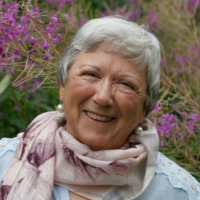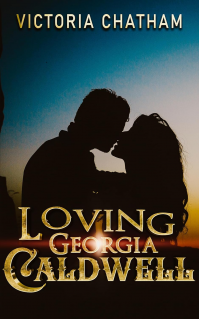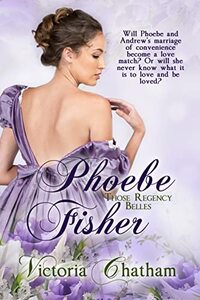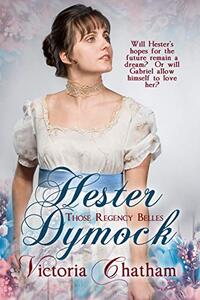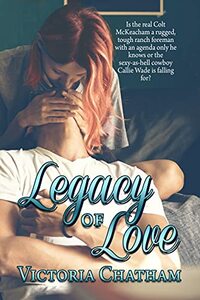Genre:
Contemporary Romance Historical Romance Western Romance Historical Fiction- Country: Canada
- Books: 4
- Profession: Author
- Born: September
- Member Since: Aug 2023
- Profile Views: 2,566
- Followers: 93
- VISIT AUTHOR: Website, Facebook, Twitter, Goodreads, Amazon,
I'm never short of ideas for what I want to write. However, fitting them all into a timeframe to write them is another matter. I have written Regency romance, historical romance, and contemporary Western romance. When I read for pleasure, I rarely read the genres in which I write but opt for thrillers, mysteries, suspense and anything that takes my fancy.
Victoria Chatham's Books
Stay in the loop on books by Victoria Chatham. See upcoming and best-selling books by the author here. You'll also find the deals on books by Victoria Chatham.
** Please note that the information or price displayed here may not be the updated. Make sure to double-check the latest book price before buying books.
** Also, there might be other books by Victoria Chatham not listed on AllAuthor.
| Book |
|---|
Phoebe Fisher (Those Regency Belles Book 3)by Victoria ChathamPublish: Jun 01, 2022Series: Those Regency BellesHistorical Romance |
Hester Dymock (Those Regency Belles Book 1)by Victoria ChathamPublish: Mar 01, 2021Series: Those Regency BellesHistorical Romance |
Victoria Chatham Interview On 18, Mar 2024
 "Victoria Chatham is a prolific writer with an inexhaustible wellspring of ideas that flow seamlessly across various genres. She has established a notable presence in the realms of Regency romance, historical romance, and contemporary Western romance. With a penchant for weaving intricate plots and memorable characters, Victoria continues to enchant readers across the globe, leaving them eagerly anticipating each new release."
"Victoria Chatham is a prolific writer with an inexhaustible wellspring of ideas that flow seamlessly across various genres. She has established a notable presence in the realms of Regency romance, historical romance, and contemporary Western romance. With a penchant for weaving intricate plots and memorable characters, Victoria continues to enchant readers across the globe, leaving them eagerly anticipating each new release."
We lived at my grandmother’s house in Bristol, England, until I was five. It was wartime, and my dad and other male members of the family were all in the forces, so it was a household of women – mums, aunties, and cousins. After being demobbed, a brief fling with civvy street saw my dad signing up for several more years of service. Then, we moved pretty well every year until he finally left the army in 1957. We moved back to England when I was thirteen, but five years later, schooling done, I left home and moved to Gloucestershire, where I lived until I emigrated to Canada.
What inspired you to pursue a career in writing, particularly fiction writing?I read since before I started school and created crazy stories to entertain the family. It was juvenile performance art at its best. English Grammar and English Literature were my top school subjects, and with two prize-winning essays under my belt, I thought I had it made. However, as a very social teenager and later a busy mom with three children, writing was something I was going to do someday. I didn’t start writing seriously until I was in my fifties and published numerous short stories and magazine articles. My first novel wasn’t published until I was sixty-nine, so to anyone reading this, take heart – it is never too late to begin writing.
You’ve written across various romance genres, including Regency, historical, and contemporary Western. How do you navigate the distinct characteristics and challenges of each era when creating your stories?I seem blessed with characters who come to me of their own accord. I see them, know their names, and then build up the stories around them. I suppose it comes from reading a lot for many years and having a fertile imagination.
Set amid Bristol’s (UK) most beautiful Regency architecture, this era has always fascinated me. I liked these homes’ style and grandeur, and Georgette Heyer’s Regency romance novels hooked me. I loved the manners, the wit, and the costumes and wanted to tell similar stories. I hadn’t enjoyed history as a subject when I was at school but quickly became immersed in it as I built feasible situations for my characters to experience. The Regency period was short, from 1811 to 1820, so I picked a year to set my story and then researched events in Europe for that year. There was much to choose from: Napoleon, Wellington, the Peninsular Wars and more. Research is the name of the game when writing any historical novel. I learned much about Alberta, Canada, when I wrote Brides of Banff Springs, Book 1, in the Canadian Historical Brides collection, set in 1935. I also co-authored Envy the Wind, Book 11, in that collection.
Although historical novels have been front and centre in my writing career, I have always been fascinated with the West and the cowboy culture. I’ve lived in Canada for over thirty years, and my Western romances are an homage to that culture. I have also met some notable characters, from bull and bronc riders at rodeos to working cowboys, who all gave authentic flavour to my imaginary ranch settings.
With a wealth of ideas for your writing, how do you prioritize and organize your thoughts to fit within a specific timeframe for writing?I’ve never thought about it, to be honest. Once I have a character and an idea, I focus on that story and its characters. If anything or anybody else crops up, I jot it down in a notebook for future reference and forget it for now. I don’t think I’ll ever be short of something to write, as I have eight untouched notebooks containing new story ideas.
Despite writing romance, you prefer reading thrillers, mysteries, and suspense. How do these genres influence your writing style or the way you approach storytelling in romance?I learn a lot from other genres. For instance, I have read many of the Jack Reacher stories written by Lee Child. I like the way he sets up his fight scenes. My romances usually have an aspect of adventure, so understanding a fight scene is handy if my Regency duke has to fight a duel or defend his lady. Building suspense is necessary to make any story worth reading. I prefer my romances to have an element of mystery in them, so reading the likes of Jonathan Kellerman, Michael Connolly, and an oldie but goodie, Dick Francis, helps me to understand how and why those stories work.
What sources of inspiration outside of your preferred genres contributed to the richness of your romance novel, “Loving Georgia Caldwell”?I know nothing about American football, but I have friends who do. I also watched the series ‘Quarterback’ on Netflix. I was thoroughly impressed with these athletes’ physical skills and mental acuity to read the game and remember all the plays. It was so far outside my experience, but it fascinated me enough to make my protagonist, Ty Harding, a football legend. The same applies to Georgia Caldwell’s cattle penning skills. I rode horses in England for many years and have enjoyed trail riding here in Canada. I first became interested in team cattle penning when I saw it for the first time at the Calgary Stampede, and the skills these riders and their horses have blew me away. It seemed an appropriate theme for Georgia’s story.
What draws you to the Regency era, historical settings, and contemporary Western landscapes? How do these time periods inspire your storytelling?As a child, I was fortunate to live in interesting places, such as Bristol, with its Regency architecture. Then, when my family lived in West Wales, we had a castle practically on our doorstep. Canada offers wide open spaces, and I love being in the mountains. I also have something of a magpie mind, so I pick at the bright, shiny things and keep them close until I either use them in my writing or lose them.
Across different genres, how do you approach character development? Are there common traits or challenges your characters face, regardless of the setting?It doesn’t matter if they are good or bad characters. People are people with all their quirks and foibles, regardless of the genre or period of history you are writing. You can as easily apply the principles of goals, motivations, and conflicts to historical heroines as to contemporary ones. Villains, too, can be created using that premise. It helps to be familiar with the social aspect of the era in which you are setting a story. The Regency era, for instance, had rigid rules of etiquette for the aristocracy, but you wouldn’t lay those same rules at a contemporary heroine’s doorstep.
As a writer, how do you ensure that your diverse audience, ranging from Regency romance enthusiasts to contemporary Western romance fans, feels engaged and satisfied with your work?I do my best to create a setting which paints a picture in words for the reader. In Regency romances, scenes might be of a busy street lined with bow-front store windows or elegant townhouses, horse-drawn wagons, carriages, and riders coming and going. Pubs would have low, dark ceilings. It is a fact that people were shorter in stature then, so a six-foot hero would need to duck his head as he entered. In a contemporary Western, it’s my job to create settings where the reader can breathe fresh, clean air and see for miles. With each genre and era, it’s a matter of perspective.
Moving from Regency to contemporary Western romance involves a shift in tone and atmosphere. How do you manage this transition, ensuring authenticity in each setting?I read as much as possible to be as authentic as possible. I have titles on my shelves ranging from The Age of Agony – The Art of Healing 1700-1800, What Jane Austen Ate and Charles Dickens Knew, to The Cowboy Life and Letters From a Lady Rancher. I make full use of my local library and love YouTube. I learned the basics of sailing a three-masted schooner for one of my Regency novels and how to dress or undress my Regency characters. I also like to visit museums wherever I am. Still, I especially enjoyed The Costume Museum in Bath, England, where my daughter and I played dress-up with the costumes and hats they had available for visitors. I take many photos wherever I am, never knowing if the sunshine and shadows in one might become helpful in a scene or an expansive view of the mountains might work in another.
Can you share some of your writing rituals or habits that help you maintain productivity and creativity across different genres?I don’t have specific writing rituals unless using paper and pencil could be considered a ritual if I can’t quite get a scene or lines of dialogue to my liking. I don’t type nearly as fast as I used to, but writing by hand tends to slow my thought process, and then I can convey the thought to the page more clearly. Regarding writing habits, once I have researched and started writing the book, I try for four solid hours a day until the book is finished.
Do you have a favorite character among those you’ve created? What makes this character special to you?Oh goodness! This is a difficult question because each character is unique to me. If I had to pick one, it would be Phoebe Fisher, Book 3 in the series Those Regency Belles. Phoebe is the well-educated, slightly spoiled (in a good way) daughter of a gentleman farmer and kept in line by her widowed aunt. She is strong-willed and can be a bit cheeky. She knows young men are more interested in her fortune but accepts a marriage proposal from almost bankrupt Andrew Fitzgibbon. I think I picked her because she was the most fun to write.
Given the diverse historical and contemporary setting you explored in your novel, “Hester Dymock, how did you approach research to ensure accuracy and authenticity in your storytelling?Hester’s story took me quite a while to research and write. Not so much for the apothecary information, as I’ve always been interested in the use of herbs and still have my copy of Culpeper’s Complete Herbal that I bought when I was nineteen, so I could utilize a lot of that knowledge. The medical information regarding the treatment of broken limbs took much longer to accumulate through accessing medical treatises in university library archives and reading novels set in the period. In doing that research, I encountered so many interesting details that I had to be careful not to get carried away.
Keeping an accurate timeline is essential, too. It’s no good writing a story set in 1818, as Hester is, and including details of a treatment that hadn’t yet been developed. I chart a timeline and then place events on it to ensure that they are in chronological order if I refer to them. Readers may not know all these facts, but if they are not authentic, I think that shows in the writing. If events in a story are not feasible, whether they are the historical context, weak characterizations, or poor plot lines, it will weaken the whole outline of the story.
Can you give us a sneak peek into any upcoming projects? Are there new genres or themes you’re excited to explore in the future?For the last couple of years, my publisher has been keen for me to write a cozy mystery. I enjoy reading them and have watched TV series like Madame Blanche and Midsomer Murders, so I get the concept. Time will tell if I master it.
How has your experience of being associated with AllAuthor been?Most enjoyable. It’s a comfortable place, with much on offer for an author to take advantage of. I like the Tweets posted about my titles. I can write a whole book with relatively little problem, but the short stuff gets me every time, so I fully appreciate the AllAuthor team’s expertise in preparing them.
Ask Victoria Chatham a Question
Have brimming questions to ask author Victoria Chatham? Ask whatever you like, but keep it appropriate.
** Please note that unanswered questions will not appear on the page. Refrain from posting promotional messages.
